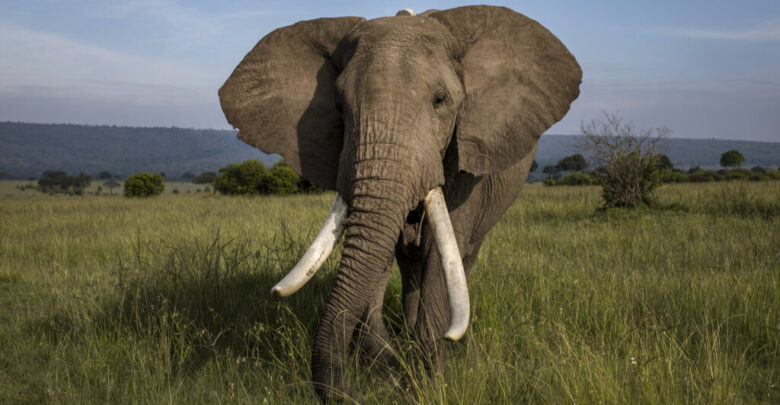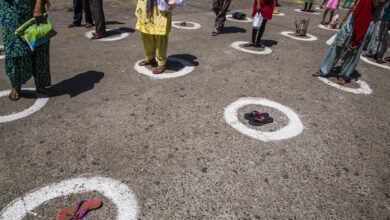

NAKURU, Kenya — When the Covid-19 pandemic devastated Kenya’s tourism industry, a group of Maasai women in Narok County, who, for decades, depended on selling beadwork and trinkets to tourists for income, discovered an unlikely alternative way to survive: making soap from elephant dung.
“When the first case of Covid-19 was reported, followed by travel restrictions, our businesses dropped, and in no time, we were recording zero sales,” Joyce Monika, the chair lady of Sikinani Women Group in Narok West Sub-County, told Zenger News.
“Luckily, a benefactor held our hands in our time of need and empowered us with skills for this soap project. We don’t know how we might have pulled through the Covid-19 pandemic.”
The project is the brainchild of Nelson Ole Reyia, the chief executive officer of Nashulai Maasai Conservancy, neighboring the Maasai Mara National Reserve.
After collecting the elephant excreta, the women dry it in the sun, grind it into a fine powder, and mix it with water and olive oil. They then add coloring powder to the liquid soap.

The mixture is then solidified, cut into pieces like other bar soaps then packaged for sale in lodges across the Masai Mara and the nearby Sikinani and Talek shopping centers.
A 50-gram bar soap goes for Sh500 [$5] on average. The women are planning to reach big towns like Narok, Kisii, Nakuru, and the capital, Nairobi, as the business grows.
Bernard Ronoh, a technical expert of the group, said dried elephant dung had been used since time immemorial to treat numerous ailments, including headaches, toothache, and skin diseases.
“An elephant feeds on various types of vegetation, including those that our great-grandfathers have used as medicine,” he told Zenger News.
“Therefore, elephant waste is full of medicinal elements that can treat various ailments. For example, inhaling smoke from elephant waste can halt nose bleeding, relieve chest pain, among other aches.”
Moses Sankale, a Maasai elder living near Nashulai Maasai Conservancy, said the Maasai used dry elephant dung as a mosquito repellant.
“Just put small dry elephant dung in a metal container and light a fire in it, and mosquitoes will disappear,” he told Zenger News. He said the smoke from the dung has no side effects on the environment and human health.
Elephant excreta is also the raw material for beer, coffee, biogas, and for making eco-friendly paper.
Through various seminars and workshops, close to 50 women in Sikinani came together for the soap project.
Monika said elephant waste is readily available, free of charge, and eco-friendly, making their soap unique compared to other ordinary soaps in the market.
“After the collapse of our beadwork businesses at Maasai Market at the Village Market (in Nairobi), life was tough,” she told Zenger News.
“Some of us could only afford a single meal, and sometimes we went hungry all day long. But when we started the soap project, everything changed. Now we can pay school fees for our children, afford the three meals and buy clothes for the entire family.”
She has put up a three-roomed, iron-sheet roofed house for her family using the money from the venture, and “much more is yet to come,” she said.
Using elephant waste as the primary raw material for their soaps also promotes elephant conservation in Maasai Mara. No member of the group will witness an elephant being poaching and keep quiet, she said.
“We must involve ourselves in elephant conservation because it’s our raw material. Without the jumbos, our businesses will fail, and poverty will follow us again.”
Due to security challenges, the Sikinani Women Group sometimes cannot collect enough dung.
However, they have hired local youth who go round every morning with wheelbarrows and handcarts collecting the waste deep into the forest in Nashulai Maasai Conservancy and Masai Mara National Reserve.

Noah Sapat, a local administrator, said domestic violence in the area has significantly reduced since families now have money in their pockets.
“The project has created job opportunities for many families here in Sikinani,” he told Zenger News.
“It has even reduced domestic conflicts as people are no longer idle at home despite the tough economic situation brought about by the Covid-19 pandemic.”
Margaret Koshal, the Nashulai Maasai Conservancy women coordinator and the force behind Sikinani Women Group, said the venture had given hope to women whose livelihoods were threatened by the Covid-19 pandemic.
“The project has facilitated women and girls in the area to afford essential but crucial things like sanitary pads, which was the major problem for young women,” she told Zenger News.
She said the venture would also curb the retrogressive cultural practices that have ruined the dreams of many women and girls in the Maasai community.
“The project reduces cases of female genital mutilation since those who depend on the practice now have alternative income-generating activities.”
The elephant dung soap project has been replicated at the Mwaluganje Elephant Sanctuary in Kwale County on Kenya’s coast region.
“We’re confident that our business will continue creating jobs for the youth and women from the Maasai community since the demand for our soap is growing by the day,” said Monika.
(Edited by Kipchumba Some and Anindita Ghosh)
The post Elephant Dung Soap Is Cleaning Up As A Beauty Treatment appeared first on Zenger News.






